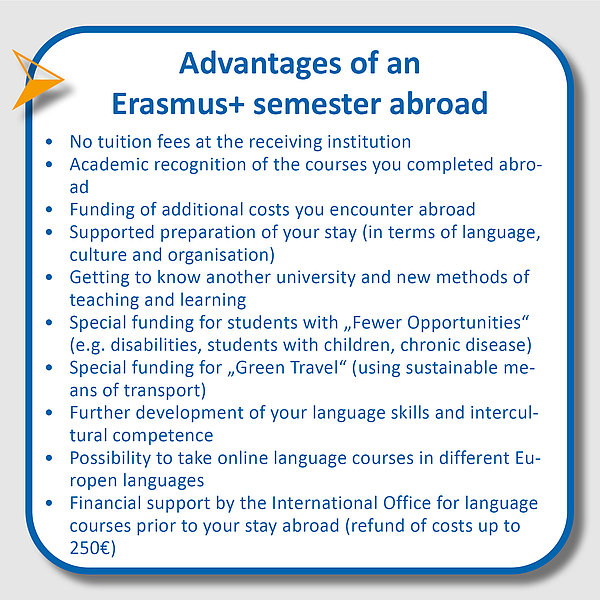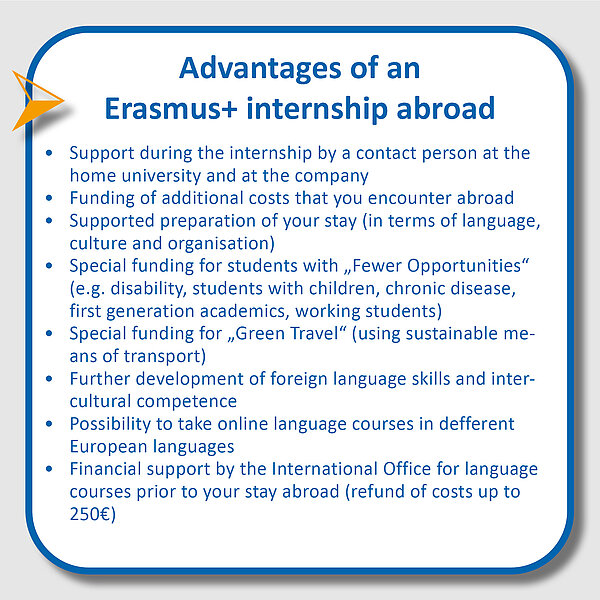Erasmus+
The Erasmus+ Programme
Erasmus+ is the European Union's programme for education, youth and sport. Among other things, it supports academic exchanges between universities in other European countries.
The current programme runs from 2021 - 2027 and has set itself the goals of helping more socially or physically impaired people to spend time abroad and of promoting digitalisation, sustainability and democratic involvement.
The West Coast University of Appied Sciences supports the following mobility measures (provided that sufficient funds are available):
[+] SEMESTER MOBILITY FOR STUDENTS (SMS)
The Erasmus+ programme enables you to study for one or two semesters at one of our partner universities in Erasmus+ programme countries and, if applicable, receive financial support.
For more information, please see our page https://en.fh-westkueste.de/en/international/outgoing-students/erasmus-mobility-for-students/

[+] INTERNSHIP ABROAD FOR STUDENTS (SMP)
The EU's Erasmus+ programme enables you to complete internships in companies or organisations in other European countries.
For more information, please see our page https://en.fh-westkueste.de/en/international/outgoing-students/erasmus-mobility-for-students/

[+] STAFF MOBILITY FOR TEACHING AND ASSIGNMENT (STA)
Erasmus+ supports visiting lectureships at European partner universities that have a valid Erasmus Charter for Higher Education (ECHE). Lecturer mobilities should aim to develop joint study programmes and promote the exchange of learning content and methods.
For more information, please see our page https://en.fh-westkueste.de/en/international/outgoing-students/staff-mobility/erasmus-mobility-university-staff/
[+] STAFF MOBILITY FOR TRAINING (STT)
Erasmus+ allows for further education and training of higher education staff in programme countries to develop internationalisation. In this sense, higher education staff from a German higher education institution with ECHE may be promoted to a host higher education institution with ECHE or any other institution established in another programme country active in the labour market or in the fields of education, training or youth. The aim of this mobility measure is to exchange expertise, gain new perspectives, strengthen own competences and expand and deepen networks.
Funding is available for university staff from all areas, such as administration, library, departments, international office, public relations, student counselling, …
For more information, please see our page https://en.fh-westkueste.de/en/international/outgoing-students/staff-mobility/erasmus-mobility-university-staff/
[+] LANGUAGE SUPPORT
Erasmus+ supports participation in language courses in two ways:
1. Online Language Support (OLS)
Once you have been accepted for Erasmus+ funding, you will also be given access to the OLS portal. Here, you can have your competence tested in the language of your host country as well as take online language courses in many European languages. Use of the OLS portal is free of charge for participants in the Erasmus+ programme and you can take as many of the available courses as you wish.
The OLS portal is available to Erasmus+ funded students for a total of three years.
2. Financial support for language courses
If you would like to take a language course of your choice in preparation for your Erasmus+ stay abroad, you can apply for a refund of course fees up to 250€ at the International Office.
To get the refund, the following steps need to be taken:
- Send an informal e-mail to the International Office describing your plans, including language, course dates, course provider, costs and the request for the refund.
- The International Office will check your application and the availability of sufficient funds.
- The International Office will issue a provisional letter of acceptance for the funding
- After completion of the course: submission of receipts for payment of course fees and course participation by the student.
- Refunding of costs by the International Office
[+] LIABILITY CLAUSE
This project has been funded with support from the European Commission. This publication states the views of the author and the Commission cannot be held responsible for the further use of the information contained in the publication.

